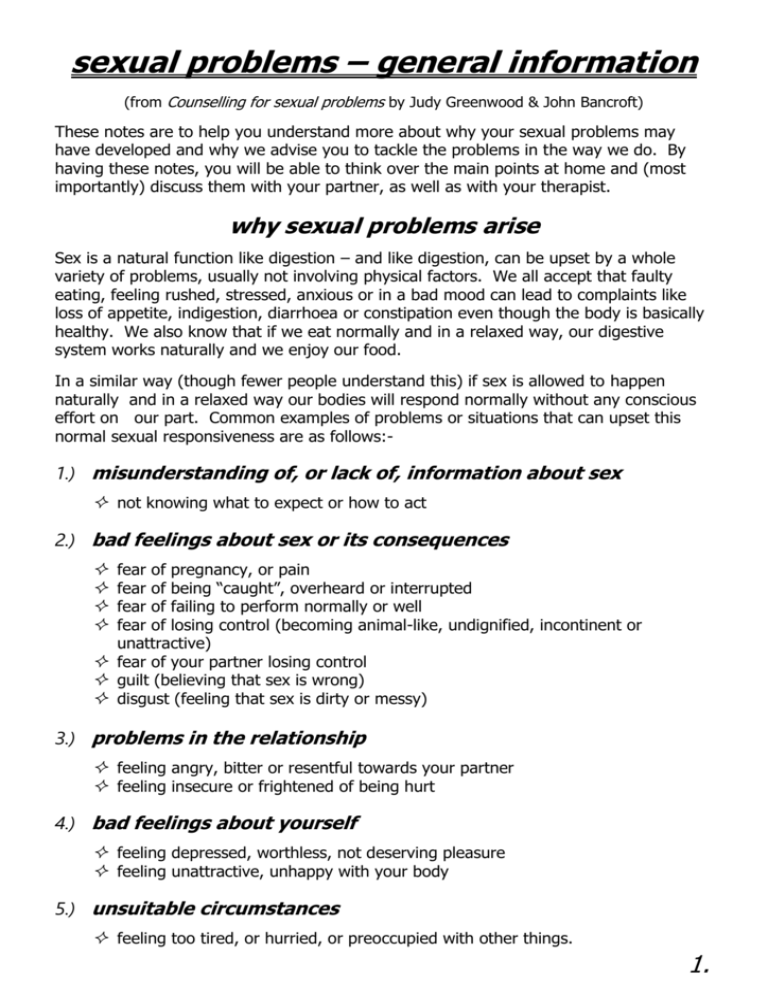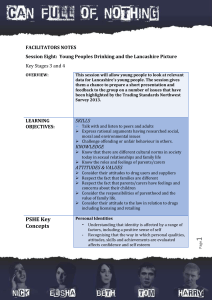
sexual problems – general information
(from Counselling for sexual problems by Judy Greenwood & John Bancroft)
These notes are to help you understand more about why your sexual problems may
have developed and why we advise you to tackle the problems in the way we do. By
having these notes, you will be able to think over the main points at home and (most
importantly) discuss them with your partner, as well as with your therapist.
why sexual problems arise
Sex is a natural function like digestion – and like digestion, can be upset by a whole
variety of problems, usually not involving physical factors. We all accept that faulty
eating, feeling rushed, stressed, anxious or in a bad mood can lead to complaints like
loss of appetite, indigestion, diarrhoea or constipation even though the body is basically
healthy. We also know that if we eat normally and in a relaxed way, our digestive
system works naturally and we enjoy our food.
In a similar way (though fewer people understand this) if sex is allowed to happen
naturally and in a relaxed way our bodies will respond normally without any conscious
effort on our part. Common examples of problems or situations that can upset this
normal sexual responsiveness are as follows:-
1.) misunderstanding of, or lack of, information about sex
not knowing what to expect or how to act
2.) bad feelings about sex or its consequences
fear of pregnancy, or pain
fear of being “caught”, overheard or interrupted
fear of failing to perform normally or well
fear of losing control (becoming animal-like, undignified, incontinent or
unattractive)
fear of your partner losing control
guilt (believing that sex is wrong)
disgust (feeling that sex is dirty or messy)
3.) problems in the relationship
feeling angry, bitter or resentful towards your partner
feeling insecure or frightened of being hurt
4.) bad feelings about yourself
feeling depressed, worthless, not deserving pleasure
feeling unattractive, unhappy with your body
5.) unsuitable circumstances
feeling too tired, or hurried, or preoccupied with other things.
1.
lack of comfort, warmth or privacy
6.) alcohol, some drugs or medicaments
these can interfere with normal responsiveness, though only temporarily
7.) being in generally poor condition
appetite for sex, like appetite for food, often (though not always) goes when
you have been ill or had an accident. It returns gradually as you regain health
how do these problems affect sexual response?
It is well known that sexual problems are caused by inhibition of the natural response,
but less well understood that it is usually “performance anxiety” that keeps the problem
going. The original resentment or difficulty may be long past, but the vicious circle of
worrying about your responses continues. You start to watch your performance as a
spectator rather than being fully involved in it – and the more you watch, the less you
respond.
In addition, if one partner fails to respond, then the other partner gets caught up in
performance anxiety too – and doubts his or her abilities as a sexual partner – there is
no such thing as an uninvolved partner so don’t make one of you the patient and the
other the therapist – you are both involved in the problem.
basic principles
a.) Improve communication within the relationship to relieve the resentments and
misunderstandings that keep a sexual problem going
b.) Correct ignorance and misunderstanding about sex
c.) Learn ways to avoid the “spectator” role and allow yourself to relax and enjoy your
natural sexual responses. By setting limits to how far you go physically for an
agreed time, this allows you to concentrate on and re-acquaint yourself with your
body sensations with no goal in mind
important points
This approach is primarily educational – you are not curing an illness but learning new
and more satisfactory ways of getting on with each other. Like any other learning
process, the responsibility for change lies with you. If you are to make proper use of
this advice, you will need to make a special joint effort to follow all the suggestions.
You will need to set aside time to be together – time to talk to each other without
frequent interruptions from children or whatever – try to find a regular half-hour (or
longer) in the day that is exclusively for you.
You will also need to aim for at least three sessions a week for physical contact –
although, of course, the more spontaneous and natural these occasions are, the better.
2.
You will need privacy (a lock on the bedroom door is not anti-social) and comfort. If
sound-proofing is a problem, put the radio on. Going to bed earlier is the easiest way
to find time for the sessions. A drink around bedtime may help. Several drinks won’t.
Don’t expect miracles at first. You may even have to force yourself to practice to begin
with. This is not surprising if you have been put off sex for a long time – you will need
to unlearn all your old habits and attitudes, wipe the slate clean and allow your natural
feelings to re-emerge – that is if you want them to.
Even if you are keen to have a baby, it is much wiser to delay getting pregnant until
after you have had a chance of improving your sexual relationship. Therefore, we
advise you to use an effective method of contraception whilst following this advice.
We suggest that you and your partner read these notes and decide independently
whether you want to work on improving your relationship now, and whether you are
prepared to make the full commitment in terms of setting aside time, making an effort
and accepting agreed limits on your physical relationship for a short time.
guidelines
communication
As mentioned in the introduction, sexual problems often stem from other problems in
the relationship and even when they don’t, they may lead to problems which in turn
spoil the relationship and serve to keep the sexual difficulties going. It is therefore
necessary to look carefully at your general relationship, particularly in the ways it may
affect your sexual relationship.
There are two aspects of relating that are important to sex, but which, if improved, have
more far reaching benefits. These are: good communication and the use of positive
rather than negative reinforcement. It is never too late to learn new ways of
communication, however long you have been together, and in our experience improved
communication is essential if a sexual problem is to be resolved.
some basic principles of communication
1.) Aim to communicate with each other as two adults. In many marriages the
husband
communicates like a father and the wife like a child … and in others the wife
behaves like a mother to her husband who reacts like a son. Such “parent and
child” relationships do not promote or encourage healthy adult sexual
responsiveness. The following points help to keep the status equal.
2.) Teach yourself to “self-assert” and “self-protect” by using the expression “I would
like … ” or “I feel hurt because … “ instead of the more traditional “Should we … ?”
or “Why don’t you … ?”. The usual method of communication (often thought to be
unselfish) is to think or guess what your partner would like rather then putting your
wishes first. This pattern can be fraught with all sorts of problems – you may
always have been guessing wrong and your partner has never liked to tell you for
fear of hurting you (being unselfish again) so that long-standing assumptions about
3.
what the other likes or dislikes may be quite incorrect. A much safer and less
complicated way to communicate is to express your own thoughts, feelings and
ideas and let your partner do the same thing. This keeps your own house in order
by asserting and protecting yourself and lets your partner do the same, so that you
are both equally represented & equally protected while the guess work has gone
out of the relationship.
3.) Encourage your partner to use the term “I” and allow him or her to express feelings
of hurt without you reacting too violently and discouraging self-expression. You are
both entitled to your own feelings and should be allowed to express them freely.
Having respect for your own and each other’s feelings is crucial. Feelings are real
things whether you think they are justified or not. If they are not dealt with, by
expressing them in a suitable way, they may become bottled up and can cause
havoc in a relationship.
4.) You will need to negotiate fairly on those occasions where each of your wants
something different. For example, if one wants black and the other wants white,
you have both declared yourselves. Rather than having grey each day it is far
better to have black one day and white the next.
5.) Praise and encouragement (positive reinforcement) work better than criticism.
Work hard at noticing and commenting on the good things your partner does.
This will have a much more positive effect than nagging about the bad things.
sexual responses
These responses can result from all sorts of factors – from fantasies, from seeing an
attractive person, hearing nice music, masturbating, touching, kissing and caressing
each other and from full intercourse.
These bodily responses usually go through three phases:-
a.)
b.)
c.)
arousal or excitement
climax or orgasm
resolution or returning to where we started
a.) arousal phase
In the man, erection of the penis may be the first thing to happen. As arousal is
increased, he feels more excited, breathes more heavily and may feel tense and sweaty.
In the woman slight swelling of the outer lips of the vagina and increased lubrication
inside the vagina occur at an early stage, as with the man’s erection. Similarly, arousal
as it increases involves other bodily responses and excitement.
The innermost part of the vagina “balloons” slightly as arousal increases, so that only
the lower part is in close contact with the man’s penis during intercourse (an important
point for men who worry about their penis being too small)
It does no harm to stop during the arousal phase before climax occurs. Unpleasant
frustration usually results from expecting more than you get (in other words it’s a
psychological rather than a physical problem).
4.
b.) climax phase
As arousal increases, the man reaches a point of no return after which he will ejaculate,
whatever happens. The fluid ejaculation can vary in quantity but is usually about a
teaspoonful. It is perfectly clean and contains good things like sugar to feed the sperm.
As he ejaculates so he experiences a climax, a sudden build up and release of tension
followed by a feeling of well-being and calm.
The woman may or may not come to orgasm or climax. She does not ejaculate like the
man but experiences a similar build-up & release of sexual tension – rather like a
“sneeze”
though much more enjoyable. An orgasm lasts approximately 5 – 15 seconds. There
are usually contractions of the vaginal wall and surrounding muscle which the woman
may be aware of. Most women need caressing of the clitoris before they reach a climax.
c.) resolution phase
This is the lull after the storm when the body settles down and both partners feel
fulfilled and calm, often pleasantly sleepy and relaxed. In the woman the feeling of
fullness or congestion in her pelvis and her general sense of excitement may take longer
to settle, particularly if she has not experienced a climax.
some misunderstandings about sexual responses
1.) The penis can become erect at a very early stage, especially in a young man. This
does not mean that he is necessarily ready for intercourse and he may start this far
too soon – before his partner feels ready. She may become anxious because she
feels she is keeping him waiting.
2.) Vaginal lubrication may remain hidden inside the vagina, especially when the
woman is lying down. Both partners may assume she is not responding when in
fact she is. Remember that the penis gives a more obvious signal of response than
the vagina.
3.) Arousal comes in waves, both the man and the woman may find that their arousal
comes and goes, with increasing and decreasing erections and vaginal responses.
This is quite normal. A decline does not mean something is wrong, so don’t get
filled with “performance anxiety”.
4.) Premature ejaculation or “coming too soon” (i.e. before either partner wants to) is
normal for young men, particularly when very sexually aroused and when there has
been a long interval since the last ejaculation. You have to learn to control it. The
notes given later will help you to learn that control. Too rapid ejaculation can also
make the woman worry that she will take too long to reach her climax.
5.) Many women never have an orgasm yet are otherwise fully responsive sexually.
This does not mean they are “frigid”. In most early sexual relationships orgasms
for the woman are unusual – yet both partners may become extremely anxious
about this. Some women pretend to have orgasms to please their partners. The
more a man demands an orgasm from a woman, the less likely she is to get one.
She needs to feel relaxed, trusting and free from pressure. Whereas performance
anxiety makes the man come more quickly, it has the opposite effect on the
woman. There is no need for her to experience an orgasm every time.
5.
6.) A man who is snoring a minute after ejaculating can produce resentment if his
partner is still feeling the need for intimacy. Wake him up sometimes and let him
sleep at other times. That way you both get what you want some of the time.
guidelines to help improve your lovemaking
These should be used in conjunction with the guidelines about communication, which
are equally important for improving sexual relationships. Your therapist will discuss the
instructions for each stage with you before asking you to try them. We suggest you
take the instructions home, read through them carefully with your partner and talk
about them. Discuss any difficulties in understanding them and any anxieties you may
feel about following them so that you can discuss these with your therapist at your next
visit. Remember what we said about good communication. Only when you both feel
comfortable with Stage I will you be asked to go on to Stage II and so on. Don’t
assume that you can miss out any stage. It is important to work carefully through each.
If, at any stage, you feel unrelaxed or tense then discuss your feelings, try again and if
necessary go back to an earlier stage.
To start with we will be suggesting definite limits beyond which you should not go in a
lovemaking session. At first it may seem a bit clinical, as though you were making love
to “doctor’s orders”, but this is a temporary phase. Before long you should be able to
set yourselves limits when making love – to be able to say “stop” without fearing your
partner will feel too upset, angry or rejected. Only when you feel safe enough to stop
will you really enjoy going on.









